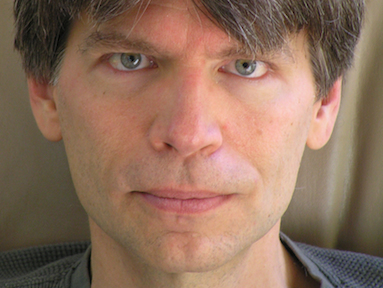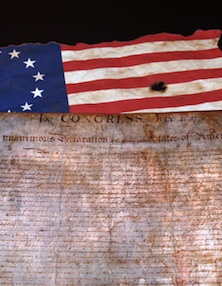
“What I really like to learn how to do is to build sentences
that are equal to mental states.”
— Richard Powers
By Victoria Mariconti
The celebrated and prolific American novelist Richard Powers (ΦBK, University of Illinois at Urbana-Champaign, 1977) yet again commands international acclaim for his latest novel Orfeo (W.W. Norton, 2014). In late July Orfeo appeared on the longlist for the 2014 Man Booker Prize for Fiction. Although the novel was conspicuously absent from the shortlist released on Septmeber 9, critics’ positive reviews sustain its momentum among readers.
Orfeo is the eleventh novel in Powers’ substantial oeuvre of fiction and essays. Beginning in 1985 with Three Farmers on Their Way to a Dance, Powers has identified himself as a defining voice in contemporary American literature. A representative sample of his awards confirms this: a MacArthur Fellowship in 1989; the Lannan Literary Award for fiction in 1999; the National Book Award in 2006 for his ninth novel, The Echo Maker; and prestigious fellowships across the United States. More important than Powers’ many recognitions, however, are the complex themes and issues of modern culture that he unravels and reweaves into narrative. His craftsmanship across multiple disciplines bears witness to a refined and life-long spirit of learning rooted in the tenants of liberal education.
An excerpt from Powers’ biography by Joseph Dewey (2002), describes the intellectual curiosity that characterized his formal studies and early professional life:
“In 1975, he enrolled as a physics major at the University of Illinois. Following a pivotal course, an honors seminar taught by Robert Schneider…he changed to English/rhetoric…Powers moved to Boston in January 1980 and worked as a computer programmer and freelance data processor…He continued his eclectic reading program, ingesting volumes of history, sociology, political science, aesthetics, and hard science theory, as well as a wide range of novels and poetry.”
Since 1985, Powers’ wide pursuits have crystallized in different combinations as novels. An examination of his latest work, Orfeo, offers insight into the contrapuntal nature of his mind. Music and Literature contributor Keenan McCracken includes this plot synopsis prior to his interview of Powers:
“Powers examines the post-9/11 political landscape through the life of avant-garde composer turned amateur chemist Peter Els, whose Orphic descent into the underworld of twentieth-century composition and his lifelong fascination with patterns leads him to attempt encoding music into the DNA of a living organism. After his makeshift home microbiology lab suddenly attracts the attention of homeland security, Peter Els is forced to flee, paying final visits to his loved ones and friends as he develops a plan to turn his run-in with the security state into his greatest work of art.”
Powers drew from his experience as a skilled amateur musician to compose Orfeo, as well as The Gold Bug Variations (1991), and The Time of Our Singing (2003). In all three, music emerges as both a context and a character paired with other culturally charged topics such as terrorism and the deepening possibilities for biological manipulation. His writings are rich with opportunities for the critical reader to play at drawing connections between modern circumstances and the greater Western cultural tradition. His greatest achievement, however, and the reason for his place of honor among ΦBK members, is his masterful orchestration of both the arts and sciences within the shared space of his novels. On this matter Powers says to McCracken:
“People want to say science is somehow this rigid, prescribed, formalist, dehumanizing set of relations and rules, whereas art is this lovely, seductive, turbulent, unpredictable human force, and the reality is that those disciplines are a lot closer than people give them credit. There are strong patterns underneath even the most turbulent and organic and voluptuous art, and there is tremendous chaos and conflict and human drama in the practicing and interpreting of science. Both science and art consist of endless propagating experiments and speculations of what is and what might be.”
Victoria Mariconti is a senior at Boston College majoring in music. She became a member of Phi Beta Kappa in her junior year. Boston College is home to the Omicron of Massachusetts Chapter of Phi Beta Kappa.




